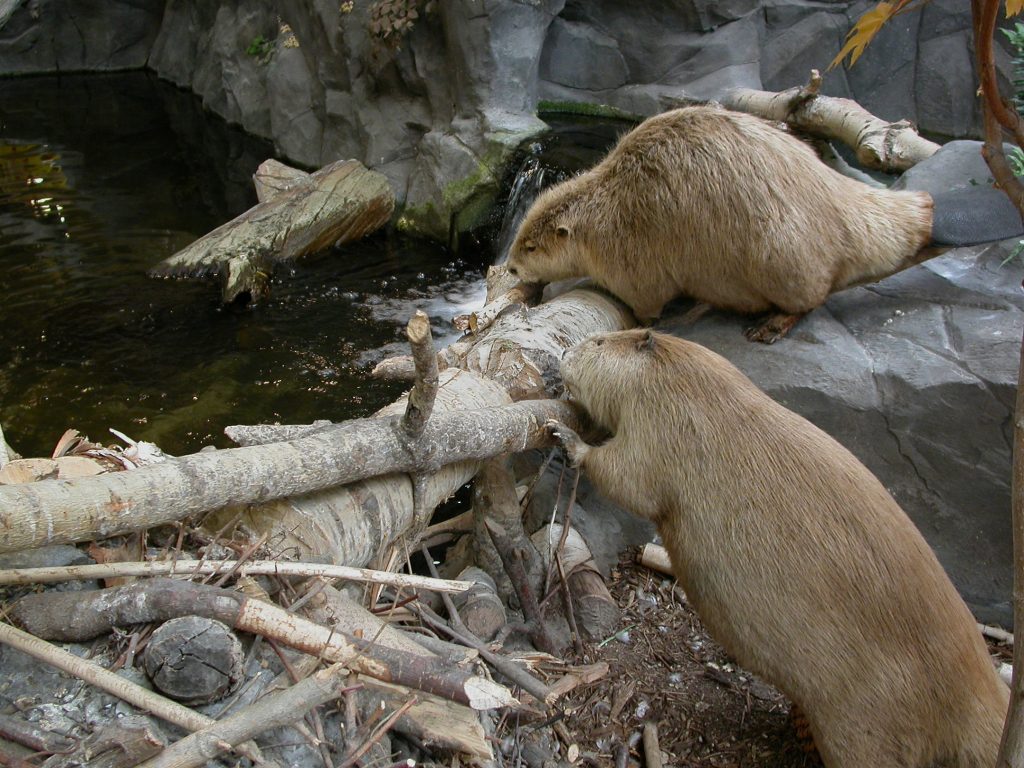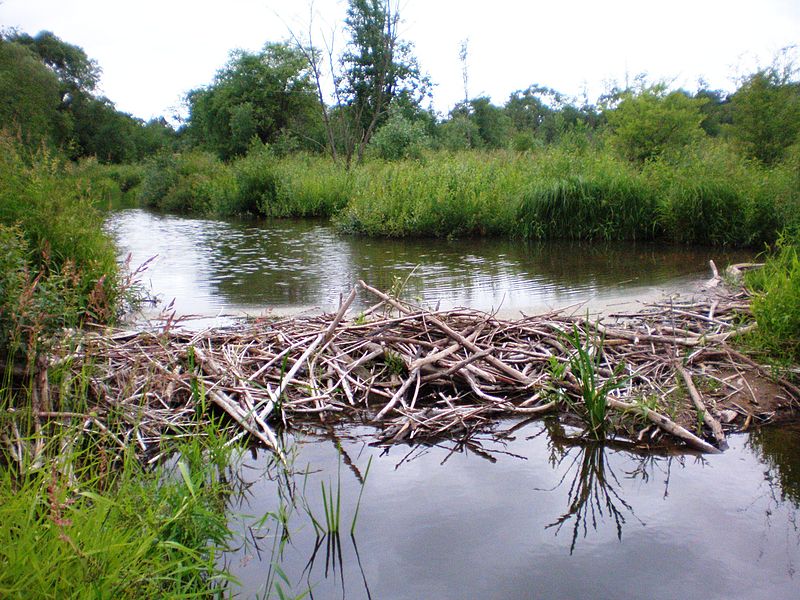
Two beavers in the act of building a dam.
Bring back beavers to fight flooding and pollution, expert claims
https://www.telegraph.co.uk/news/2017/06/03/bring-back-beavers-fight-flooding-pollution-expert-claims/
Why beavers could be the UK’s secret weapon against flooding
Beavers cut flooding and pollution and boost wildlife populations
Five-year study of animals in Devon finds measurable benefits to wildlife and people
Beavers have alleviated flooding, reduced pollution and boosted populations of fish, amphibians and other wildlife, according to a five-year study of wild-living animals in Devon.
The report, which will help the government decide whether to allow wild beavers to return to England after being hunted to extinction more than 400 years ago, concludes that the species has brought measurable benefits to wildlife and people.
The study, by a team of scientists overseen by Prof Richard Brazier of the University of Exeter, concludes that beavers’ quantifiable benefits on the River Otter, including eco-tourism and “ecosystem services” such as flood alleviation, outweigh costs such as the minor flooding of some farmland.

The beavers, which escaped from a captive population, were discovered in 2013 living wild on the river. When plans to exterminate the animals were greeted by a popular outcry, the government agreed to a scientific trial, with the funds entirely raised by Devon Wildlife Trust and its supporters.
The number of beavers on the Otter has risen from two breeding pairs in 2015 to at least eight pairs today as the herbivorous rodent has expanded along tributaries including the River Tale.
The beavers’ positive impact includes one family constructing six dams upstream of the flood-prone village of East Budleigh. The dams have slowed the flow of floodwater through the village, reducing “peak flows” during flood events.
The scientists also found that the beavers played a significant role in filtering pollutants including manure, slurry and fertilisers from the river, while new wetlands created by the beavers have benefited water voles, riverine birds such as dippers and wildfowl including teal. There were 37% more fish in pools created by beaver dams than in comparable stretches of river. Trout have been recorded leaping over beaver dams during high river flows.
While beavers prevent flooding by slowing floodwater flows, their dams can also flood valuable valley farmland. The study identified an “adverse impact” at just five sites in the 250km2 river catchment over five years.
In one case, a small organic potato field was flooded. Riverside orchards were also at risk from beavers gnawing the trees, but negative impacts were mostly solved with active management.
Wire guards were provided to protect trees while Devon Wildlife Trust and Clinton Devon Estates – a supportive local landowner – occasionally removed beaver dams or installed “beaver deceivers” to prevent flooding. Beaver deceivers are pipes that carry water through beaver dams without the beavers realising, to lower water levels and stop flooding.
“Following five years of detailed research work, the report concludes that the positive impacts of beavers outweighed the negatives,” said Brazier. “However, it also makes clear that those who benefit from beaver reintroduction may not always be the same people as those who bear the costs, highlighting that the reduction of flood risk in communities downstream may come at a cost of water being stored on farmland upstream.”
Mark Elliott, who led the River Otter beaver trial for Devon Wildlife Trust, said: “We’ve all been surprised by these amazing animals’ ability to thrive, once again, in our wetland ecosystems. It also shows their unrivalled capacity to breathe new life into our rivers and wetlands, very few of which are in good health.
“There are overwhelming reasons why beavers should be reintroduced back into the wider countryside.”
According to Elliott, the key to successfully returning the beaver across England will be to provide support for affected landowners, so that those who lose small areas of farmland to flooding will not incur financial losses.
In recent months the government has licensed dozens of schemes for wild beavers to be placed in large fenced areas in valleys to help with flood alleviation and restoring wildlife.
But Elliott said the next step would be for the government to approve wild releases into particular river catchments. “We’re not zookeepers, we’re conservationists and it’s a native species to Britain so we shouldn’t be having to keep them in with fences in the long-term,” he said.
Tony Juniper, chair of Natural England, said: “It is fantastic to see the successful reintroduction of these majestic creatures back into the English countryside, which Natural England has licensed. I commend the work of the Devon Wildlife Trust in helping to show how beavers can have such a transformative impact on the natural world.
“This is a massive step towards boosting the richness of wildlife around the River Otter, reducing pollution, mitigating flooding and making this landscape more resilient to climate change.”
The Department for Environment, Food and Rural Affairs has announced an extension of the Devon trial until September, when it will decide if the Devon beavers can remain.
If Defra backs the beavers, it is likely that a new licensing system will enable the release of free-living beavers in other river catchments – with the beaver officially recognised as a native species again.


Dredging was stopped 25 years ago. How stupid. And they are still building on flood plains. EU legislation such as the Water Framework Directive has prevented local authorities from undertaking dredging of rivers.
While the European Commission has said that dredging is not banned by EU legislation, in effect member states are prohibited from undertaking dredging if it disturbs certain habitats which can then lead to a breach of the EU Water Framework Directive.
Comment by Dave Lawton on 25 February, 2020 at 4:03 pm